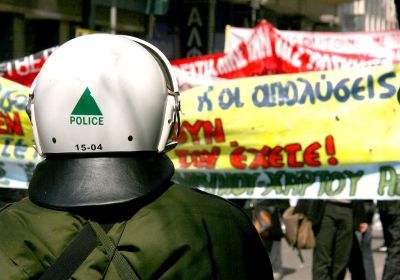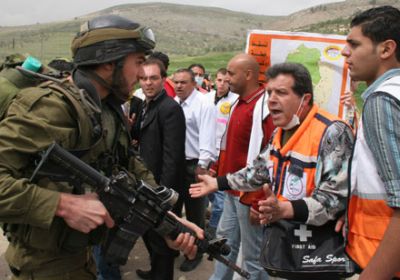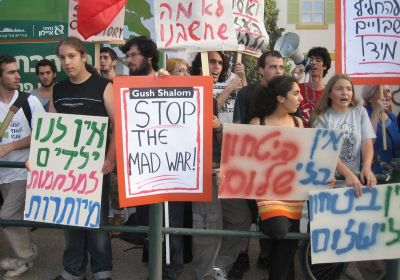Thousands of workers across France protested on May 27 against President Nicholas Sarkozy’s planned attacked on the French pension system.
The protests were called by a coalition of union confederations, including the General Confederation of Labour (CGT); French Democratic Confederation of Labour (CFDT); United Union Federation (FSU); National Union of Autonomous Unions and Solidaires. They came after the government failed to withdraw or modify the planned changes to the pension system following protests on March 23 and May 1.
-
-
 Hundreds of Thais and an Australian remain in jail, as the government of Prime Minister Abhisit Vejjajiva continues to repress the grassroots pro-democracy Red Shirt movement. Some Red Shirt protesters are still in hiding. This follows the full-scale military assault on May 19 that ended a six-week protest by thousands of Red Shirts in the commercial centre of Bangkok. Australian Colin Purcell, of Perth, has been caught up in the repression and is still detained by police.
Hundreds of Thais and an Australian remain in jail, as the government of Prime Minister Abhisit Vejjajiva continues to repress the grassroots pro-democracy Red Shirt movement. Some Red Shirt protesters are still in hiding. This follows the full-scale military assault on May 19 that ended a six-week protest by thousands of Red Shirts in the commercial centre of Bangkok. Australian Colin Purcell, of Perth, has been caught up in the repression and is still detained by police. -
 The US's worst-ever environmental disaster took yet another bad turn after British Petroleum's (BP) latest efforts to stop the torrent of oil from the Deepwater Horizon well failed. Public discontent is growing, with increasing calls for a government takeover of the operation and seizure of BP’s assets. The Deepwater Horizon oilrig exploded on April 20, killing 11 workers and releasing between 19.7 million and 43 million gallons of oil into the Gulf of Mexico.
The US's worst-ever environmental disaster took yet another bad turn after British Petroleum's (BP) latest efforts to stop the torrent of oil from the Deepwater Horizon well failed. Public discontent is growing, with increasing calls for a government takeover of the operation and seizure of BP’s assets. The Deepwater Horizon oilrig exploded on April 20, killing 11 workers and releasing between 19.7 million and 43 million gallons of oil into the Gulf of Mexico. -
 The struggle against inflation, corruption, and destabilisation in Venezuela’s economy is continuing. In the last week of May, workers from nationalised companies marched to protest hoarding and price speculation and call for worker-run management, while national investigators arrested the former president of the state-run food company PDVAL for alleged involvement in the diversion of food from the market.
The struggle against inflation, corruption, and destabilisation in Venezuela’s economy is continuing. In the last week of May, workers from nationalised companies marched to protest hoarding and price speculation and call for worker-run management, while national investigators arrested the former president of the state-run food company PDVAL for alleged involvement in the diversion of food from the market. -
 In early March, after a three-month media bombardment about the country’s economic crisis, the Greek government — backed by conservative opposition parties, the European Union (EU)and the International Monetary Fund (IMF) — announced harsh austerity measures for ordinary people. These included unprecedented salary, pension, job and public services cuts and large-scale privatisation. The government offensive entails an enormous income transfer from workers and pensioners to big business and the State Revenue Office.
In early March, after a three-month media bombardment about the country’s economic crisis, the Greek government — backed by conservative opposition parties, the European Union (EU)and the International Monetary Fund (IMF) — announced harsh austerity measures for ordinary people. These included unprecedented salary, pension, job and public services cuts and large-scale privatisation. The government offensive entails an enormous income transfer from workers and pensioners to big business and the State Revenue Office. -
 Moshe Dayan, Israel’s most celebrated general, famously outlined the strategy he believed would keep Israel’s enemies at bay: “Israel must be a like a mad dog, too dangerous to bother.” Until now, most observers assumed Dayan was referring to Israeli military or possibly nuclear strategy, an expression in his typically blunt fashion of the country’s familiar doctrine of deterrence.
Moshe Dayan, Israel’s most celebrated general, famously outlined the strategy he believed would keep Israel’s enemies at bay: “Israel must be a like a mad dog, too dangerous to bother.” Until now, most observers assumed Dayan was referring to Israeli military or possibly nuclear strategy, an expression in his typically blunt fashion of the country’s familiar doctrine of deterrence. -
Venezuela foreign minister Nicolas Maduro said on June 2 that Venezuela’s announced cancelling of Haiti's debt of US$395 million with Petrocaribe was now official. Petrocaribe is a program under which the Venezuelan government offers discounted oil, to be paid back over long-term low-interest loans, to Caribbean and Central American nations. Maduro made the announcement after the World Summit on the Future of Haiti. The summit was held in the Dominican Republic with the participation of representatives from 50 countries.
-
The Qatar-based media network Al Jazeera has published on its website a series of harrowing eyewitness accounts from survivors of Israel’s military raid on a flotilla of ships bringing humanitarian aid to Gaza. An example is published below. To read the full list, visit www.english.aljazeera.net. * * * Haneen Zabi, member of the Knesset (Israeli parliament): “We were expecting the Israeli army to stop us, to prevent us from entering but surely we didn't expect such a war against us.
-
As news was released of Israel's attack on the Freedom Flotilla and rising casualties among the passengers, the mood at Gaza's modest seaport grew sombre. Hundreds of civilians including governmental and non-governmental representatives, activists and ordinary Palestinians were waiting anxiously to welcome those on board the flotilla. All were shocked when news of the naval attack was first reported and silence overwhelmed the gathering.
-
 The picture is clear: the activists attacked in the Israeli military’s May 31 nighttime commando raid on a boat bringing humanitarian aid to Gaza were not armed. In Israel, the media is broadcasting disinformation, using edited videos. But it is clear there was no crossfire during the raid, just Israeli fire. Israel claims there was an attempt by activists onboard the Mavi Marmara, to steal weapons from soldiers. But either the army’s spokespeople or the soldiers themselves are telling false tales.
The picture is clear: the activists attacked in the Israeli military’s May 31 nighttime commando raid on a boat bringing humanitarian aid to Gaza were not armed. In Israel, the media is broadcasting disinformation, using edited videos. But it is clear there was no crossfire during the raid, just Israeli fire. Israel claims there was an attempt by activists onboard the Mavi Marmara, to steal weapons from soldiers. But either the army’s spokespeople or the soldiers themselves are telling false tales. -
The Brussels-based European Campaign to End the Siege on Gaza said it had already secured funds to support three new aid ships to be sailed to Gaza, the Ma’an News Agency said on June 2. The fleet will be called the Freedom 2. Campaign head Arafat Madhi said it would be “much bigger than the first”, which included nationals from more than 40 nations and 10,000 tons of aid. The first fleet is now held by Israel after the takeover of six ships in international waters on May 31.
-
Dutch prosecutors fired the opening salvo on May 31 in a notorious case involving a Swiss-based oil trader which dumped hazardous waste in Ivory Coast, the British Morning Star said on June 1. The dumping was allegedly to save itself the paltry sum of €400,000 (about A$576,000). The article said prosecutor Luuk Boogert accused oil trader Trafigura AG and local authorities of putting “self-interest above people’s health and environment” at the criminal trial in Amsterdam. The ship had docked at Amsterdam en-route to Ivory Coast.